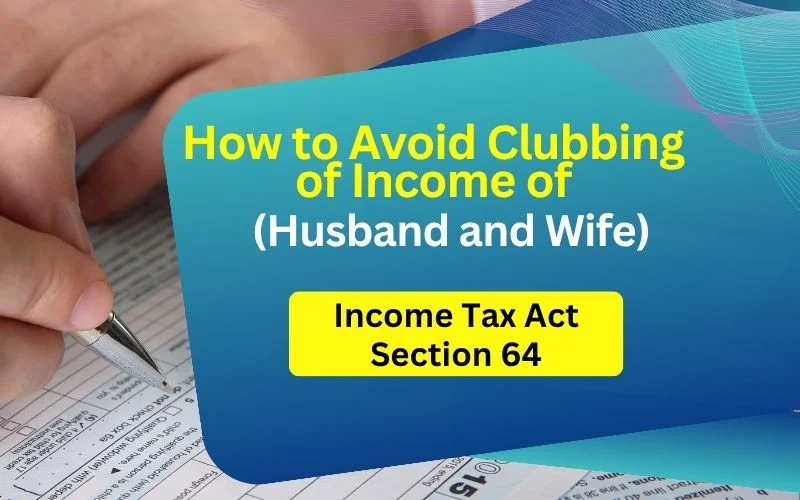As a fee-only financial advisor, I’ve witnessed countless couples unknowingly fall into the clubbing of income trap while attempting to optimize their taxes. Understanding how to avoid clubbing of income of husband and wife has become one of the most frequently asked questions in my practice. Last month, a friend called me in distress after receiving a notice from the income tax department for incorrectly reporting their spouse’s income.
The clubbing of income provision under Section 64 of the Income Tax Act is designed to prevent individuals from transferring income or assets to their spouse simply to save tax. However, being aware of these guidelines can help you better manage your money without breaking any laws.

What is Clubbing of Income in Income Tax Act?
A “clubbing of income” situation occurs when someone else’s income is included in your own, and you are liable for your taxes. The income that is included in your income is referred to as “deemed income.”
Sections 60 to section 64 of the Income Tax Act of 1961 outline income clubbing regulations. This provision allows them to avoid their tax obligations by transferring assets or income within their family. All forms of investments, including shares, mutual funds, fixed deposits, real estate, and post office savings, are included in the rules of clubbing of income.
Let’s assume your total annual income is ₹16,00,000. This includes:
- ₹12,00,000 from your salary
- and ₹4,00,000 from a fixed deposit interest
You now choose to move the fixed deposit to your wife’s name in order to lower your taxable income and get below the basic exemption limit. You do not, however, give up ownership of the money or the asset that generates that interest.
According to the provisions of the income tax, simply shifting the income to your spouse’s name without transferring the asset does not work for tax planning. In these situations, the money you make (can be interest) will still be combined with your income rather than being treated differently.
Suggested Read: Money Management Formula: Step-by-Step Guide for Budgeting
So, for tax calculation purposes, your total taxable income remains ₹16,00,000, not ₹12,00,000. This rule is especially important when dealing with rental income without transferring the asset, interest income, or capital gains involving family members.
Key Takeaways:
Understanding the clubbing of income, meaning, and its scope helps individuals to effectively manage their financial transactions while remaining within the legal framework and minimizing unintended tax liabilities.
- Section 64 of income tax act (along with sections 60-63) governs these provisions to maintain tax equity and prevent tax avoidance through family transfers
- Asset transfers to spouse without adequate consideration trigger clubbing – any income would be added to the transferor’s total income
- Professional income earned by a qualified spouse through their expertise – clubbing is not applicable when the spouse has relevant qualifications
- The key test is whether the spouse whose income is being earned possesses relevant qualifications and works independently
- The principle is clear: you cannot separate income from the asset that generates it without genuinely transferring ownership
What are the key Provisions under the Clubbing of Income?
Section 60 (Transfer of income without transfer of asset)
Section 60 of the Income Tax Act deals with the transfer of income without transferring the underlying asset. This is one of the most common scenarios that I see couples unintentionally trigger.
For example, if you own a rental property but direct the rental income to your spouse while retaining ownership, the rental income will be combined with your total income. The income tax law is clear: income cannot be separated from the asset that generates it.
Section 61 (Revocable transfer of asset)
Section 61 of the Income Tax Act covers revocable transfers. If you transfer an asset to your spouse but retain the power to revoke or cancel the transfer, any income generated from such assets will be considered your income for income tax purposes. The tax system treats revocable transfers as if no real transfer occurred.
Section 64(1A): Clubbing of Income of Minor Child
While this provision doesn’t directly concern spousal income, it impacts family tax planning strategies that married couples should understand.
Under Section 64(1A), income derived from a minor child’s investments or assets gets included in the total income of whichever parent earns more. This applies to all children under 18, including stepchildren, adopted children, and even married daughters who are still minors.
Key points for parents to remember:
- Income earned by children through their own physical work or labor remains exempt from clubbing
- Earnings from activities that genuinely utilize the child’s specialized skills, talents, or knowledge are not clubbed
- Once a child reaches 18 years (major child), their income is earned independently, and clubbing provisions do not apply
- Children with disabilities as defined under section 80U have their income exempted from clubbing
When a minor child’s income gets clubbed, parents can claim a deduction of ₹1,500 per child under the old tax regime. Additionally, if parents are divorced or separated, the child’s income gets clubbed with whichever parent actually maintains the child during that financial year.
Clubbing of Income of Spouse [Section 64(1)(ii), 64(1)(iv), 64(1)(vii)]
These are the core provisions of clubbing of income that directly impact married couples:
64(1)(vi)
If your spouse receives salary income or any remuneration from a business where you hold a substantial interest, this income gets clubbed with yours. However, there’s an exception – if your spouse possesses technical or professional qualifications relevant to their role, and the income is earned solely through their expertise, clubbing provisions will not apply.
64(1)(viii)
When you transfer assets to your spouse without adequate consideration, any income from other sources generated by these assets gets included in the total income of the transferor. This is where many couples make expensive mistakes.
💡 Important Note:
- The clubbed income is taxed as per your spouse’s income slab, not yours.
- This clubbing continues as long as the gifted funds are traceable, including reinvestments.
How to avoid Clubbing of Income?
Based on my experience helping couples navigate these tax laws, here are legitimate strategies to avoid triggering the clubbing of income that applies:
1. Transfer to Parents
Any amount transferred to your parents as a gift won’t be taxable in their hands. If they invest this amount, the income increases will be taxed in their hands, and the clubbing provision won’t apply. This is because parents aren’t covered under Sections 60 to 64 for clubbing of income.
2. Investment in PPF
Since interest earned on PPF is exempt income, even if you invest in PPF in your spouse’s name or a minor child, there’s no taxable income to club. Each individual can invest up to ₹1.5 lakh annually in PPF, effectively allowing a couple to shelter ₹3 lakh annually from taxes.
3. Gifts Received During Marriage
Any gifts received during marriage ceremonies are exempt from tax. Subsequently, any income derived from investing these gifts won’t be subject to clubbing. The key is proper documentation showing the source of income was marriage gifts.
4. Spouse’s Independent Professional Income
If your spouse has professional qualifications and earns income through their expertise, clubbing provisions will not apply. This is particularly relevant for couples where one spouse is a professional (doctor, lawyer, CA, etc.).
Suggested Read: A Good Financial Plan Can Make Your Money Dreams Come True! Let’s Plan 2025
Tax Implications of Clubbing of Income
When clubbing of income applies, several tax implications arise:
- Income of another person gets added to your total income, potentially pushing you into higher tax brackets
- You become liable to file an income tax return showing the clubbed income
- TDS credits in your spouse’s name need to be transferred to your PAN
- Higher tax liability due to progressive tax rates
The income tax department expects proper disclosure of all clubbed income when you file an income tax return. Non-compliance can result in penalties and interest.
It’s important to understand how clubbed income impacts your tax calculation. The extra money is taxed at your marginal tax rate, which frequently raises your total tax obligation, especially if the original plan was to transfer income generated to a lower tax bracket.
Suggested Read: How to Create Multiple Streams of Income Through Smart Financial Planning in 2025
Let’s understand a few basics:
- If lottery winnings from your minor child get clubbed, they’ll be categorized under Income from Other Sources.
- Similarly, rental income from property transferred to your spouse gets classified under Income from House Property.
The fundamental principle remains that clubbed income retains its original head of income classification.
I’ll give an example to help you understand this better:
Mr. Sharma earns a salary of ₹6 lakh annually and files ITR-1. However, when his minor daughter won Rs. 2 lakh in a quiz competition, this prize income is clubbed with his income as per Section 64 of the Income Tax Act. Suddenly, he needed to file ITR-2 instead of the simpler ITR-1 form. This change in filing requirements catches many taxpayers off guard.
The key takeaway is that clubbing of income provisions don’t just affect your tax liability – they also determine which ITR form you must use. Always consider potential clubbed income before selecting your return form to avoid compliance issues.
Common Mistakes Couples Make While Tax Planning
In my practice, I’ve seen these recurring mistakes that trigger unnecessary clubbing:
Joint FDs with Husband’s Funds in Wife’s Name
Many couples open joint fixed deposits using the husband’s funds but in the wife’s name, thinking this will save tax. The income generated gets clubbed to the husband as he provided the principal amount without adequate consideration.
Business set up in spouse’s name but managed entirely by the other
Setting up a business in the spouse’s name but having it entirely managed by the other spouse often triggers clubbing. The income tax department looks at who actually controls and manages the business, not just the nominal ownership.
Usage of a minor’s income for family expenses
Using income earned by a minor child for family expenses instead of keeping it separate can complicate tax filings. While the child’s income is being clubbed with the higher-earning parent, maintaining separate accounts helps with compliance.
An academic study shows that while 63% of salaried taxpayers in India are aware of income‑tax provisions, only 40% understand slab rates and available deductions, and over 55% lack awareness as a primary barrier to compliance. Source
How Clubbing Differs for Salaried vs Business vs Freelance Couples
The application of clubbing of income provisions varies based on your source of income:
Salaried Couples
- Joint investments from salary savings need careful structuring
- Rental income from jointly owned properties requires proper documentation of individual contributions
- Dividend income gets clubbed based on who funded the investment
Business Couples
- Putting spouse on payroll requires genuine work and professional qualifications to avoid clubbing
- Partnership structures need proper documentation of individual capital contributions
- Business income splitting requires legitimate business reasons
Freelance Couples
- Joint projects need clear documentation of individual contributions
- Co-investing in tools and assets requires proportionate ownership documentation
- Income from other sources like royalties needs proper attribution
How to give Money to Your Spouse with Adequate Consideration (and Legally Avoid Clubbing)?
One of the smartest methods to avoid the clubbing of income trap is to ensure that any financial transfers between you and your spouse are made with proper consideration. In simple terms, it means you’re getting something of fair value in return. Here are some practical ways to do that:
Option 1: Offer a Loan Instead of a Gift
- Instead of gifting it outright, give it as a loan
- Charge a reasonable interest rate (6–7% per annum)
- Draft a basic loan agreement that outlines the amount, and interest rate
- Ensure the interest is actually paid back periodically
✅ Since you’re receiving interest income in return, this is a transaction with consideration—so the clubbing provisions won’t apply.
Option 2: Include Your Spouse in a Business Venture
If your spouse is involved in your business or wants to start their own, you can provide capital by making them a partner or supporting their proprietorship.
- Ensure they actively contribute to the business—not just as a name on paper
- Their share of the profit should be linked to their work or skill
✅ Income earned from genuine effort (not just capital contribution) may escape clubbing provisions.
Option 3: Purchase Assets from Your Spouse at Fair Market Value
Let’s say your spouse owns something valuable. Be it a laptop, an asset, or shares, and you buy it from them at its fair price.
- That money is now theirs to invest as they want
✅ Since this is a legitimate sale, and not a gift, so any income they earn from reinvesting that amount won’t be clubbed with your income.
What You Should Avoid:
- Token transfers like buying a pen for ₹5 lakhs or transferring money for “₹100” are red flags
- If the transaction doesn’t reflect real market value, the tax department may still apply clubbing rules
Keep Proper Documentation
If you go for a loan, make sure to:
- Always document the transaction. Use a signed agreement or stamp paper if needed
- Mention principal amount, interest rate, and repayment terms
- Maintain clear records of interest payment (preferably bank transfers)
Why is it Important?
Because when your spouse is in a lower tax slab, structuring your finances smartly and legally avoiding clubbing can reduce your family’s overall tax liability.
Should You Still Spread Your Investment Despite Clubbing Rules?
With these income tax rules, you know that spreading investments between spouses won’t automatically reduce tax liability. Instead, focus on legitimate tax planning strategies that don’t trigger clubbing provisions. Plan your finances better by understanding the law, not by trying to circumvent it.
Suggested Read: How To Attain Financial Freedom | 11 Steps to Achieve Financial Freedom
The reality is that effective tax planning doesn’t end with understanding what gets clubbed with the income of the transferor.
Smart couples understand that although some transfers are considered under clubbing of income, there are still many acceptable methods. Finding situations where income rises from legitimate independent sources or meets certain exemption requirements is crucial. Instead of completely giving up on tax optimization, couples should concentrate on increasing their wealth using strategies that automatically avoid invoking these provisions while still adhering to all tax laws.
Bottom Line – Best Practices for Clubbing Provision Compliance under Section 64 of the Income Tax Act
The rules of clubbing are complex, but understanding them helps you make informed decisions. The goal isn’t to prevent tax through artificial arrangements but to optimize your family’s tax burden through legitimate means.
Remember, the clubbing income provision was introduced to maintain tax equity, not to penalize legitimate financial planning. With proper understanding of Section 60 to 64 and careful execution, couples can still achieve tax efficiency while remaining compliant with income tax law.
The key is balancing tax optimization with compliance requirements. As income increases and your financial situation becomes more complex, professional guidance becomes invaluable for navigating these provisions of clubbing of income effectively.
Suggested Read: How to Double Your Money?
FAQs: How to Avoid Clubbing of Income of Husband and Wife
Q-1: What is clubbing of income under Section 64?
Clubbing of income refers to adding another person’s income (usually family members) to your total income for tax purposes. This prevents individuals from transferring income or assets to family members solely to reduce their tax burden.
Q-2: When does clubbing of spouse’s income apply?
Clubbing applies when you transfer assets to your spouse without adequate consideration, when your spouse earns from a business where you have substantial interest, or when you arrange indirect transfers for your spouse’s benefit.
Q-3: Can I gift money to my spouse without tax implications?
Direct cash gifts to spouses can trigger clubbing if the gifted amount generates income. The income generated from investing gifted money gets clubbed back to the giver unless specific exceptions apply.
Q-4: Does clubbing apply to income earned on clubbed income?
No, clubbing provisions would not apply to income earned on previously clubbed income. For example, if ₹20,000 interest gets clubbed in your hands and your spouse earns additional income from this ₹20,000, this secondary income won’t be clubbed.
Q-5: What are the exceptions to the clubbing of income between spouses?
Exceptions to clubbing include: pre-marriage transfers, divorce settlements, transfers for adequate consideration, spouse’s professional income from their qualifications, and assets acquired from pin money.
Q-6: How do I show clubbed income in my tax return?
When you file an income tax return with clubbed income, you must use ITR-2 or ITR-3 forms and disclose the clubbed income in Schedule SPI. The income derived gets added to your respective head of income.
Q-7: Can professional spouses avoid clubbing of employment income?
Yes, if your spouse has relevant professional qualifications and the income is earned solely through their technical expertise, clubbing of income provisions doesn’t apply to their employment income.
Q-8: What happens if I transfer property before marriage?
Assets transferred before marriage generally don’t attract clubbing even if income accrues after marriage. Both the time of accrual of income and transfer are considered under income tax law.
Q-9: How does clubbing affect my tax bracket?
Clubbing can push you into higher tax brackets as the income of another person gets added to your total income. This progressive taxation impact is one reason why the clubbing provision effectively prevents tax avoidance.
Q-10: What documentation is needed to avoid clubbing issues?
Maintain records of: adequate consideration paid for transfers, professional qualifications of spouse, timing of transfers relative to marriage, source of funds for investments, and independent income sources of family members.





